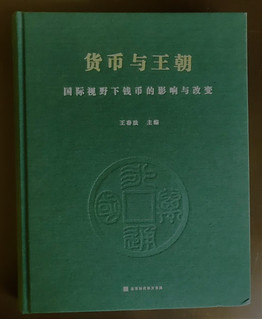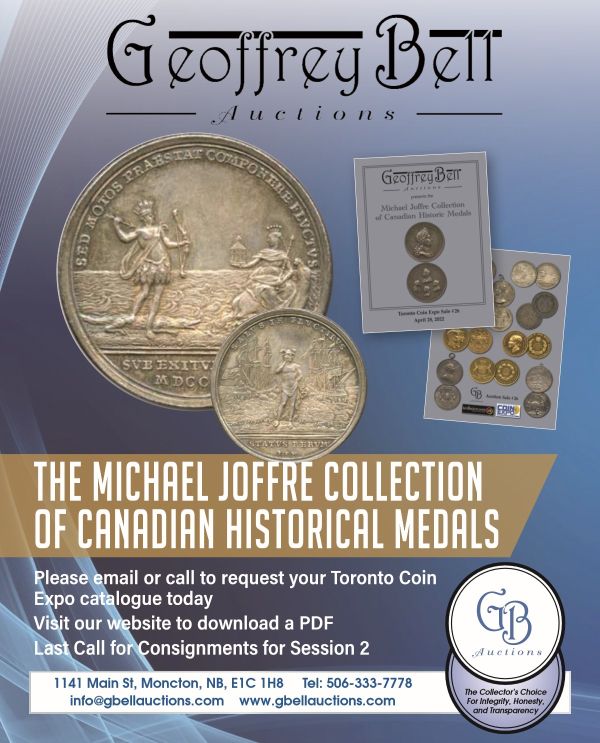
Recently published is Money and Empire: coin influence and change from a world perspective .
Here's an excerpt from the announcement in the Chinese Money Matters blog published by Helen Wang, Curator of East Asian Money, The British Museum.
-Editor
 WANG Chunfa:Huobi yu wangchao: guoji shiyexia qianbi de yingxiang yu gaibian. Beijing shidai huawen shuju. ISBN 978-5699-3724-4. [WANG Chunfa (ed.-in-chief). Money and Empire: coin influence and change from a world perspective. Beijing: Beijing Shidai Huawen shuju, 2020. 325 pp. In Chinese]
WANG Chunfa:Huobi yu wangchao: guoji shiyexia qianbi de yingxiang yu gaibian. Beijing shidai huawen shuju. ISBN 978-5699-3724-4. [WANG Chunfa (ed.-in-chief). Money and Empire: coin influence and change from a world perspective. Beijing: Beijing Shidai Huawen shuju, 2020. 325 pp. In Chinese]
This volume is the proceedings of the international conference held at the National Museum of China, 13-14 November 2019. It contains the 32 papers listed below (my translations are approximate) and foreword by the Director of the National Museum of China. A total of 42 papers were presented at the conference and are listed at the back of the book.
-
WANG Chunfa (Director, National Museum of China) – Foreword (p.3)
-
HUANG Xiquan (Zhengzhou University) – On a newly seen Fancao spade-money weight and Banquan, site of the war between Yandi and Huangdi (p.1)
-
HE Ping (China Renmin University) – The principles of coin casting and circulation in ancient China, and the hierarchical structure of money, as see in in King Jing of Zhou's
casting large coins (p.7)
-
DI Shengli (National Museum of China) – Inscriptions on the large knife-money of Qi (p.13)
-
ZHU Anxiang (Hebei Normal University) – Currency circulation in the Wei, Jin and Northern and Southern Dynasties (p.27)
-
GAO Cui (National Museum of China) – Popular customs relating to paper money in the Tang dynasty (p.40)
-
JIANG Shunyuan (National Museum of China) – Wen Tianxiang's
Shang Hong Zhai Tie reveals a paper money crisis in the late Song dynasty (p.46)
-
ZHOU Xiang (Shanghai Museum) – The Dachao tongbao and associated questions (p.52)
-
LIU Shunqian (Palace Museum Department of Scientific Research) –
Tian qi
xing qian and the unification of the national currency in Yunnan in the Ming dynasty (p.59)
-
TONG Chunyan (National Museum of China) –
Amituofu charms (p.68)
-
YE Daoyang (Guangdong Maritime Silk Road Museum) – On the currency objects excavated from the Nanhai No. 1 Shipwreck (p.75)
-
WANG Liyan (National Museum of China) – Gold in China's ancient monetary system (p.82)
-
ZHAO Xiaoming (Xi'an Numismatic Museum) – Gold money in China – historical predicament and sources (p.93)
-
WANG Xianguo (Capital Museum) – The use of silver in early China and the development of the silver liang system (p.106)
-
WANG Jijie (China Numismatic Museum) – The
nan liang gai zhi 50-ounce ingot of Tianqi 1 (1621) and associated questions (p.114)
-
WU Danmin (Shanghai Museum) – On silver currency in the Ming dynasty (p.121)
-
LI Jinxiu (Institute of Historical Research, Chinese Academy of Social Sciences) – On the Sasanian silver coins in the Shuozhou Museum, Shanxi
-
YANG Fuxue (Dunhuang Academy) and YUAN Wei (Guizhou Provincial Museum) – The evolution of inscriptions on Central Asian Hellenistic coins
-
GUO Yunyan (Hebei University) – A catalogue of the Byzantine gold coins and gold pieces found in China (p.146)
-
LI Xiaojia (Zhongshan University) – An exploration of the changes in headwear on the obverse of Sasanian coins before the 5th century
-
Agshun Aliyev (Beijing Foreign Languages University) – Ancient coins unearthed in Azerbaijan and their value on the Silk Road (p.177)
-
QI Xiaoyan (Changzhi Institute) – On Sogdian imitations of Chinese ‘Kaiyuan tongbao' coins (p.188)
-
ZHENG Yue (Yinchuan Branch, People's Bank of China) –The cultural characteristics of world coins from the dual perspective of coins made in East and West (p.190)
-
ZHOU Weirong (China Numismatic Museum) – The Influence of the Silk Road on China's silver money (p.198)
-
LAN Rixu (China Central Finance University) – The evolution and characteristics of Silk Road Money (p.208)
-
DAI Jianbing (Hebei Normal University) – Trade between ancient India and China and the exchange of coin culture (p.216)
-
CAO Guangsheng (Jiu Da Cultural Media Co.) – Han-to-Tang East-West cultural exchange and fusion as seen in the coins of the Zhaowu Nine Tribes (p.224)
-
Jonathan JARRETT (University of Leeds), tr. ZHANG Yue – Market exchange in the Byzantine empire and the Reform of Emperor Anastasius I (p.266)
-
ZHOU Jianming (Institute of Culture, History and Tourism Management, Guangxi University, and Guilin Numismatic Society – A world view of coins circulation and influence – from the perspective of silver dollars of Annam circulating in China's southwestern border areas (p.277)
-
YUAN Lin (Xi'an Branch, People's Bank of China) – The large influx of Japanese and Vietnamese cash into China in the 18th and 19th centuries and how the Qing government responded to it (p.285)
-
Georges DEPEYROT (École Normale Supérieure, Paris), tr. ZHANG Yue – The relationship between metal and coins in Europe (p.296)
-
Helen WANG (British Museum), tr. ZHANG Yue – Displays of coins and medals at the British Museum, 1759-2019 (p.307)
-
The Papers Presented at the Conference // 研讨活动读论文目录 (p.324)
To read the complete article, see:
84. BOOK: MONEY AND EMPIRE
(https://chinesemoneymatters.wordpress.com/2022/03/31/84-book-money-and-empire/)
Wayne Homren, Editor
The Numismatic Bibliomania Society is a non-profit organization
promoting numismatic literature. See our web site at coinbooks.org.
To submit items for publication in The E-Sylum, write to the Editor
at this address: whomren@gmail.com
To subscribe go to: https://my.binhost.com/lists/listinfo/esylum
Copyright © 1998 - 2024 The Numismatic Bibliomania Society (NBS)
All Rights Reserved.
NBS Home Page
Contact the NBS webmaster
|



